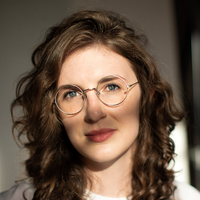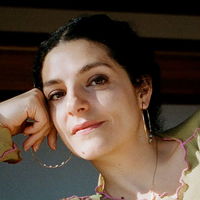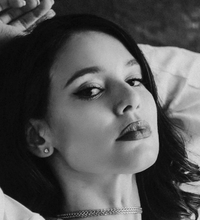As told to Michelle Lynn King, 2472 words.
Tags: Writing, Process, First attempts, Success, Money, Creative anxiety.
On being proud of your work
Novelist and book critic Lauren Oyler on taking risks, writing in the first person, managing self-doubt, and why she increasingly doesn't have a good answer for "why we write."I’ve heard you say that you knew for a while that you wanted to write a novel, but were waiting for the right idea to come along. How did this idea begin? What did the first few pages of Fake Accounts look like?
I wish that I could remember because I’m starting another one and I’m like, “Is this right?” But it doesn’t matter. It doesn’t matter if it’s what I did before. I started [writing the novel] right after Trump was inaugurated and then I remember really struggling for the first six months. One day, the first paragraph clicked in this voice, this sort of harder, sassier voice. I think initially it was not funny enough or something, and that’s why it was difficult. For a while, I thought about doing it in third person, and then I realized that all the books that I liked were in first person, and I’m really interested in the issues of the first person narrator and the author in the time of the internet.
I’m personally resistant to the term “unreliable narrator.” A better way to consider the first person, I think, is as a type of performance. It seems to me that the narrator of your book is very aware she’s speaking to an audience.
Yeah. I think there is an extent to which the performance is true. If you’re the kind of person who does that performance, then that’s what kind of person you are. I think there’s this expectation that beneath the performer is some kind of sad, overcompensating person who needs to be loved, and that’s why they’re performing and that we would all, our true selves, would all be basically the same. There’s this idea that we all have the same self underneath, like our coping mechanisms, and I think that that’s kind of ridiculous.
Whatever performance you choose says a lot about who you are.
Exactly. There’s this resistance now to trusting anyone, and I think a low-lying reason for that we all know everybody’s performing. We’ve all learned this, right? We’ve all learned that everybody’s performing all the time and that the self is a fiction. We’ve over-corrected or something into that knowledge, in part, because of social media. Yes, my character is an unreliable narrator, but she’s not so unreliable.
Something I’ve heard you say about your reviews is that you try to judge the book based on whatever terms the author seems to have set for themselves and see if they are successful on those terms. When you’re writing, how are you able to determine if you’ve been successful in the terms you’ve set out for yourself? With writing, it can be so difficult to have any sense of how an audience—not to mention a reviewer—might read your work.
Criticism actually helped a lot. I think that it helped me define a lot of terms that I don’t agree with, and then I was sort of like, okay, what framework do I agree with? What do I think this should be? It’s not an absolute. I don’t think all novels should be this way. I don’t think all fragmented novels are ill-conceived or anything like that, but I think writing criticism helped me be very intentional with everything that I was putting in. Everything I put in is there for a reason, even if the reason is just “this is funny.” I’m not making sure every sentence is a perfect diamond because I don’t think that that’s possible. I wanted the book to feel alive and energetic, like something that sometimes has made rather than produced in a factory.
As a reader, it did seem to me that you were taking risks in the writing. Did it feel like that when you were writing it?
When you’re really in the zone and you’re writing and things are coming to you, it’s great. I didn’t have many of those moments when I was writing the book but, sometimes an idea would come to me and I’d just be like, “Yes!” You know, I think what I like about writing fiction instead of criticism is that you don’t have to explain everything that you’re doing. There are lots of different ways to make a point that, in nonfiction, you have to sort of spell out. But did the writing feel risky? I don’t know. I mean, in the end, it was quite hard to sell it. [*laughs*] I didn’t think that it would be because, yes, it’s very risky, but it has scenes in it and it has relevant themes. It’s about sellable things.
And it has a plot, right?
Yeah, it does have a plot.
I would not consider it a plotless novel.
No, and people have been saying that. I think that’s very strange because I’m like…I just read a book about a woman who goes to Switzerland and, at the end, you find out it’s because she didn’t want to get married. And you’re telling me that I didn’t have a plot? [laughs]
Well, this idea about how people talk about books relates to something I wanted to ask you. I get the sense that, because of your work as a critic, you’re somebody who is very aware of what books are being talked about and what’s trending are and how publishing works, and I wonder if that ever affected your ability to write.
There’s a moment when you feel yourself being afraid or being cautious, and then getting over it feels good and you can tell when you’re being honest or true in some way. I have such disdain for so many of the trends and I can just see how hollow they are. I would be absolutely embarrassed and devastated if I wrote something that was dishonest or selling out in some way.
How do you differentiate between internal measures of success and external measures of success?
I don’t know. I was just talking to my friend today about how we think probably most writers or people who are in public in some way must have a hole in their brain where their public persona goes, like you can’t actually control it and I don’t actually know where you stand even if you know objectively. Approximately, you have these markers of success or these markers of failure, but I think the thing that I want is for the writing to be good. When you write a book, you have to re-read it many, many times, so I was very happy that, when I was reading it over and over, I was like, “This is good!” I think probably all of us—or maybe I just got this into my mind because I was dating someone at the end of college who was applying for MFAs three years in a row, and they were very much on this internet MFA scene. Do you know about the Facebook groups and things of the past?
I do, yeah.
There was this real sort of philosophy that you just need to get as much money as you can and have as much time as you can in order to be a writer, so just like to do as little work for as much money as possible so that you can focus on being an artist. I think that that is probably still a good metric. That’s how I think about it, anyway. Can I earn a living and do this?
It is a good metric, though figuring out how to make a living while creating work that you’re proud to stand behind can be difficult. Because if the focus is just to make money and have time, literary fiction is probably not the best route.
Yeah, totally. There are a couple of writers who’ve had successful novels, and they’ve given these interviews afterwards that are like, “I wrote that novel to pay the rent, and it’s totally bullshit and everyone loved it.” Ottessa Moshfegh is one and Nell Zink does that, as well. They’re always sort of bragging about doing this, and I’m like, “No. I would rather write a really great novel, but I’d also get a million dollars.” I’m not willing to write something under my own name that I think is crap that has some sort of heartwarming lesson about female friendship or whatever. Because I worked as a ghost writer several times, it makes me feel more protective of my real writing because I’m like, “I could write crap.” Not that those books are crap. It’s just like it’s not the same measures of success.
You mentioned that you’ve read through your own book a bunch of times, which you do when you’re editing a novel and you’re proud to stand behind it, which is good, obviously. But I’m curious if you ever have moments of self-doubt and, if so, how you worked through those.
Yeah, I have them all the time. There’s this thing on Twitter, in particular, where you can just be like, “I’m sad. I can’t write. I haven’t written in six months, and I’m terrible” or whatever, and someone will zoom in to be like, “I love you.” I think that that’s sort of…not cheating. Cheating isn’t the right word, but cheap and not fulfilling.
When I get compliments, they sort of like go in one ear and out the other where it’s like when people say mean things, you remember them forever. Self-doubt-wise, I just think that I’m not that special, and lots of other people have been able to do this. Therefore, I can also do it.
I’ve heard you say that you have a clear idea about publishing, but aren’t so sure what you think about writing. Can you tell me more about that?
I just increasingly don’t have a good answer for why we write. A lot of my process is about eliminating clichés and understanding what is a cliché and then trying to come up with something original and not just leaning on received wisdom. The received wisdom about why we write is that we read to develop empathy with each other and to tell our story. It’s always just sort of tautological when people talk about why we write, and it’s like to tell our stories or whatever, to express ourselves. Expressing myself is definitely not the reason why. I think that that’s kind of a selfish reason, but I don’t know the best way to explain what I think I’m doing and what I hope to be doing.
I do think that a lot of people appreciate my writing because it makes them feel like less alone or less tormented by what the perceived consensus view is. But is that enough of a reason? Is that why I write? I don’t know. Why do I want to write? I came up with a character. Why do I want to write this character? Why do I believe that this person needs to be in a novel and why do I believe that people should read this novel? Why do I believe people should read my book reviews? I definitely have a real conviction that they’re important somehow, but I don’t know why that is.
I’ve been thinking a lot about this lately. Another one of the “why we write” clichés is that, we write to make sense of the world. But that doesn’t feel quite true to me.
I do increasingly think of writing as articulating something that is already existing, and that is useful, but then I don’t think of it as making sense of things. I think of it as revealing things or illuminating them. I don’t know what the drive is or where it comes from. I clearly think literature is very important, but it’s hard for me to talk about that without immediately reaching for one of these canned ideas. There’s something about the challenge of writing and putting things into language that other people can really understand that is appealing.
Did you feel that your book had expectations that maybe other debut authors don’t have because you are this person who writes reviews?
Yeah, definitely. I think that that’s fine. I think that other people should have higher standards, quite frankly. When you put something into the public and ask other people to spend eight hours or more with it, that’s a serious proposition and that it shouldn’t be treated the way I think many people treat it, which is, “It’s so nice for her that she got to follow her dreams” or something. My dream has nothing to do with your time. I wish that more people were held to those standards.
I hope writers create work that they’re proud of and that feels honest to them and, also, I think that there should be higher standards in the publishing industry. I personally don’t know how to hold those two ideas in my hands at the same time.
I don’t think that those things are incompatible at all. It’s a boring point, but I do think that, if we had a more robust welfare system in the country and it were possible to make a living, there would be less of this. There is a tension in the United States where you can’t be criticizing someone’s work because that’s their livelihood and they don’t have health insurance otherwise. From my experience in Germany—not that they don’t publish bad books there, which they do—but there’s not this kind of like preciousness about one’s work in the same way because you can live. There are plenty of options for you.
The book industry just feels very different over there.
The marketing stuff is very frustrating here. It does color how I think of my future work when it would be ideal to just write. At the same time, having someone to work against is useful.
Lauren Oyler Recommends:
Bolletje’s Truffel Chocolade Kruidnoten: I was very drunk at my neighbor’s house and he brought these out. He is Dutch, and his mother sent them to him. I was extremely enthusiastic about them, pronouncing them “the perfect candy,” as well as overly apologetic about how many I was eating because I didn’t want to deplete his supply of the precious treats. A couple of weeks later there were two bags outside my door.
Clawz SG - Whenever I write I have to listen to workout music because otherwise I don’t have the stamina to continue.
Margaux Williamson’s new online show “at” White Cube, online through May 11, 2021
Punctuating every new book you read with a novella by César Aira.




